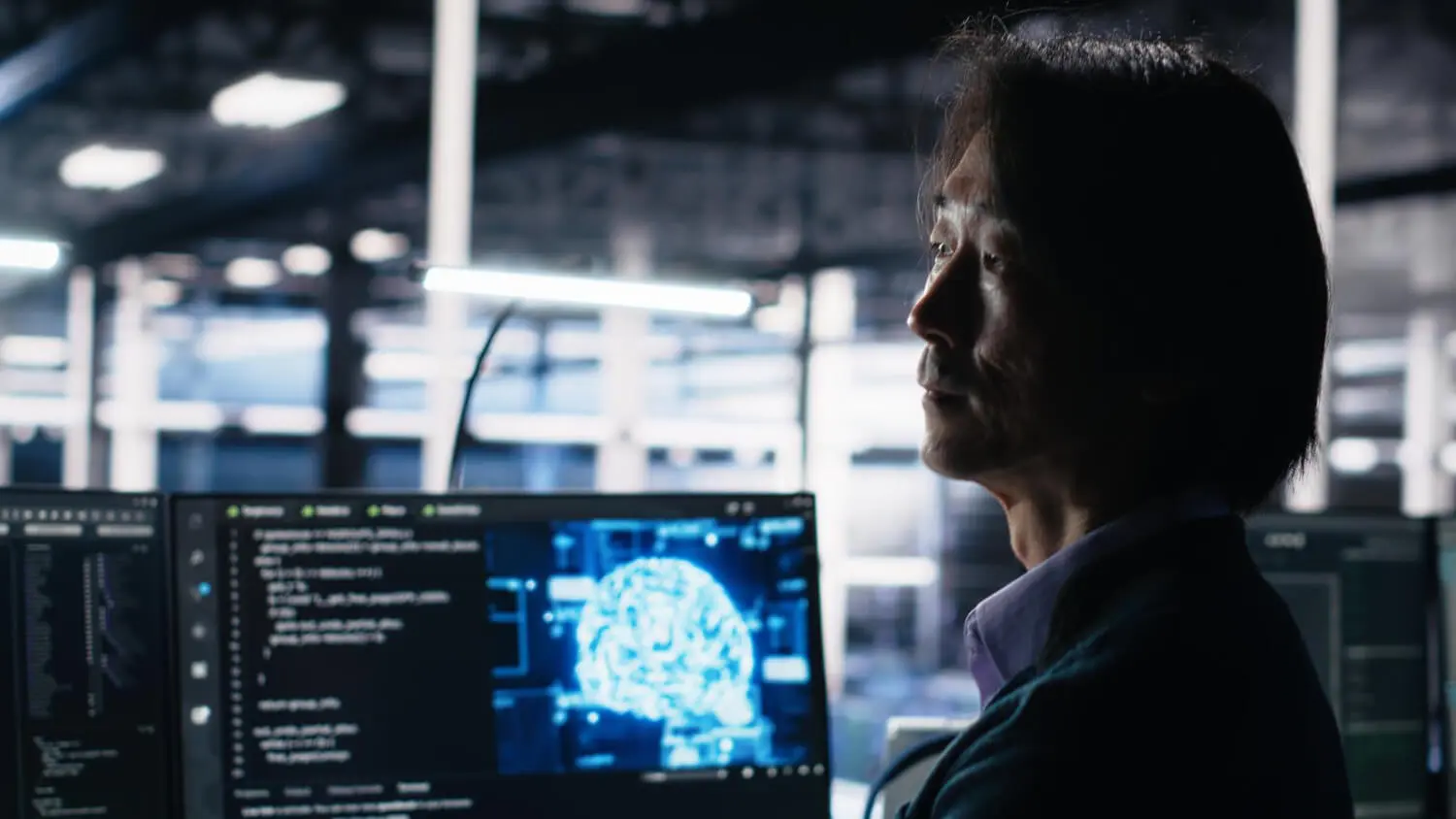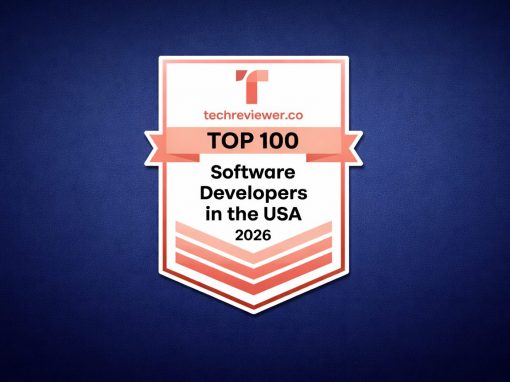Table of Contents
Listen to article
We recently put together a piece on the top AI development companies and how they’re pushing technology forward. Now, we’re taking it a step further by diving deeper to bring more info on a sub-area of AI development: AI integration.
But wait, isn’t it the same thing?
Not exactly. AI development is the broader process of designing, building, and deploying applications that use artificial intelligence for tasks like data analysis, decision-making, automation, natural language processing, and more.
AI integration, on the other hand, is a sub-area of that process—focused on embedding those systems into existing tools, workflows, and infrastructure so they generate real business impact.
In other words, AI integration is key to building a successful AI strategy, which makes choosing an integration partner equally important. To help you navigate integration, we’ve created a list of the top AI integration companies in 2025, along with tips for choosing the right partner and more.
What is AI integration?
AI integration is the process of embedding AI tools and technologies into existing systems, applications, and workflows as part of a broader artificial intelligence product development effort. By connecting models to the right data, tools, and processes, AI moves beyond development into practical use, with technologies like machine learning, large language models, and natural language processing integrated into business applications.
As a result, companies can enjoy greater process automation across systems, real-time, data-driven decision-making support, and highly tailored personalization.
How Different Industries Are Leveraging AI Integration
Now that you know what is AI integration, let’s take a look at how some of the leading industries are using AI integration to get ahead:
- Healthcare: Embedding AI into records, imaging, monitoring, and patient care systems so providers can deliver faster diagnoses, personalized treatments, and more efficient care.
- Education: Using AI to personalize learning paths, automate grading, and integrate smart tutoring systems that adapt to each student’s needs.
- Manufacturing: Integrating AI with IoT sensors in production lines, supply chain systems, and quality control to predict maintenance needs, reduce downtime, and optimize output.
- Finance: Leveraging AI in fraud detection, risk assessment, and customer service tools to secure transactions, guide smarter investments, and streamline banking operations.
- E-commerce: Integrating AI into recommendation engines, customer support, and inventory systems to deliver personalized shopping experiences and efficient order fulfillment.
- Media & Entertainment: Applying AI to content curation, video editing, and audience analytics, enabling creators and platforms to produce, personalize, and distribute content more effectively.
What to Look for in an AI Integration Partner
AI business integration bridges the gap between AI development and an organization’s existing systems, with the AI strategy consultant, it will ensure that all models are aligned with data, customized to business needs, and embedded seamlessly into workflows for long-term performance.
That said, it’s no secret that choosing the right company is key to successful AI implementation. So what characteristics should you look for when choosing an AI integration partner?
Here are the key factors to consider:
Has Extensive AI Knowledge & Experience
Your partner or AI Web developer should have extensive knowledge of AI tools, techniques, technologies, and algorithms, grounded in strong artificial intelligence software engineering practices. This expertise should extend beyond general AI concepts to include machine learning, deep learning, natural language processing, computer vision, generative AI, MLOps practices, and more.
Because this experience enhances the effectiveness of your AI solution, ensuring that the AI is embedded where it creates the most value.
Prioritizes Innovation
In order to stay ahead of the competition, you need an integration partner that thinks outside the box. For example, rather than using the same strategy as other companies in your industry, they should rethink how AI is integrated into your operations, driving value where others overlook it.
With 78% of respondents in a recent study reporting that they use AI in at least one business function, having a future-focused mindset can be the make-or-break advantage that sets you apart.
Puts Security at the Forefront of Every Solution
From data exposure to API vulnerabilities and unauthorized access, the security risks of AI integration are always present—which is exactly why you need a partner who knows how to navigate them.
That’s where experienced AI integration consulting makes a difference. From role-based access control and data encryption to taking the time to understand the capabilities and limitations of your AI tool, your partner’s goal should be to reduce risks and keep your company protected.
Has a Proven Track Record
Testimonials and reviews give you valuable insight into a company’s strengths (and weaknesses). You can review third-party platforms like Clutch, which provide unbiased feedback from past clients to help you make a more informed decision.
We also suggest reviewing each company’s portfolio, case studies, and published success stories to see which industries they’ve worked with and the solutions they’ve delivered.

Top 10 AI Integration Companies in 2025
Who are the top artificial intelligence integration companies in today’s market?
Let’s take a look:

Scopic
Scopic is an AI-driven software development company that specializes in using the latest machine learning and AI techniques to enhance business processes. Their advanced AI development and AI integration services demonstrate their commitment to blending innovation with functionality, ensuring AI creates measurable business value.
Core Strengths:
- Proven expertise with custom AI solutions and integrating AI into complex systems
- Strong focus on security and compliance with practices aligned to HIPAA, GDPR, and industry standards
- Tailored AI solutions designed to optimize processes such as predictive analytics, workflow automation, intelligent decision support, and more
Rating: 4.9/5 on Clutch from 61 reviews

LeewayHertz
LeewayHertz specializes in AI development for startups and enterprises. From evaluating your unique needs to providing integration and support, they offer end-to-end integration services that help companies maximize efficiency.
Core Strengths:
- Technical expertise for seamless implementation
- Solving complex technology challenges
- Proactive maintenance and support
Rating: 4.7/5 on Clutch from 9 reviews

Markovate
Markovate is dedicated to creating AI-driven solutions that align perfectly with their clients’ goals. From AI consulting to seamless integration, they help companies embed AI technologies into existing processes.
Core Strengths:
- Applying AI where it delivers the most impact
- Building secure, scalable AI solutions
- Streamlining business processes through smart integration
Rating: 5/5 on Clutch from 11 reviews

Intellectsoft
Intellectsoft is a digital transformation consultancy that provides custom software development services across a wide range of industries. By leveraging modern technologies, they drive innovation through seamless AI integration.
Core Strengths:
- Expertise in emerging technologies
- Tailored, customer-centric consulting
- Secure integration using APIs and event-driven architecture
Rating: 4.9/5 on Clutch from 40 reviews

Plavno
Plavno puts AI technologies at the forefront of their development approach. As experts in AI technologies, they help clients integrate new solutions into existing platforms, making digital transformation smooth and effective.
Core Strengths:
- Identifying new opportunities for AI
- Building clear roadmaps for implementation
- Delivering time-sensitive solutions
Rating: 4.9/5 on Clutch from 55 reviews

Trigent
Trigent builds AI agents that operate inside their clients’ workflows. They specialize in rapid prototyping, secure integration, and platform modernization—everything you need to accelerate business growth.
Core Strengths:
- Ethical and responsible AI adoption
- Enabling secure, contextual AI experiences for teams
- Compliance with globally recognized industry standards
Rating: 4.8/5 on Clutch from 54 reviews

Linnify
Linnify is a global technology partner specializing in AI, machine learning, data engineering, and more—delivering solutions that integrate seamlessly into enterprise systems.
Core Strengths:
- Integration with existing systems from day one
- Designing user-centered digital solutions
- Building products aligned with real market needs
Rating: 5/5 on Clutch from 40 reviews

GenAI.Labs
GenAI.Labs is an AI consultancy that creates intelligent, scalable solutions for their clients. As experts in AI technologies, they provide advanced integration that drives sustainable business growth.
Core Strengths:
- Integration with minimal disruption
- Solutions designed to align seamlessly with your brand
- Combining technical expertise with industry insight for optimal results
Rating: 5/5 on Clutch from 20 reviews

Amplework
Amplework is an AI development agency that helps companies tackle real-world challenges. Their team is dedicated to streamlining implementation while creating flexible, industry-focused solutions.
Core Strengths:
- Building future-ready platforms
- Embedding automation into business processes
- Optimizing system efficiency
Rating: 4.9/5 on Clutch from 51 reviews

Neoteric
Neoteric is a trusted technology partner that helps companies innovate and grow. Specializing in GPT integration, they enhance customer service, accelerate concept development, and deliver intelligent solutions tailored to business needs.
Core Strengths:
- Choosing the right technologies for each project
- Embedding security controls and ensuring regulatory compliance
- Defining clear project roadmaps during workshops
Rating: 5/5 on Clutch from 66 reviews
Your Cheat Sheet to Choosing an AI Integration Partner
With so many factors and companies to consider, we’ve put together a list of questions to ask potential partners to help guide your journey:
- What AI technologies, models, or platforms do you specialize in?
- Can your solutions be tailored to our specific workflows and industry needs?
- How do you future-proof integrations so they don’t become obsolete as technology evolves?
- Can you integrate AI into our existing systems with minimal disruption?
- How do you ensure data privacy and security during integration?
- What does your development process look like, and how long does it typically take?
- What kind of post-deployment support and monitoring do you offer?
- Can you share examples or case studies of ROI achieved for similar companies?
- How do you collaborate with internal teams during integration?
Final Thoughts
Developing an advanced AI solution is only the first step toward increased productivity. Companies must then integrate it into their existing processes and systems while overcoming potential obstacles such as data issues, compliance concerns, and technical hurdles.
That is why choosing the right AI integration partner makes all the difference. Among today’s AI consulting companies, the right partner will not just deliver an AI system. They will provide a solution that helps you automate tasks, improve decision making, personalize experiences, and achieve long term goals.
At Scopic, our AI integration services and AI consulting services help you bridge the gap between advanced technology and practical application.
If you’re ready to discuss your project, schedule a free consultation with our team today.
FAQs about AI Integration Companies
How do I choose the right AI integration partner?
When choosing an AI integration partner, you should look for partners with proven expertise in AI technologies, strong security and compliance practices, a commitment to innovation, and a track record of successful implementations.
What’s the difference between AI development and AI integration?
AI development is the broader process of designing and creating advanced systems, while AI integration is the process of embedding AI technologies into existing systems, applications, and workflows.
What are the risks of poor AI integration?
The risks of poor AI integration include biased outcomes, security vulnerabilities, operational inefficiencies, and reputational damage.
How long does AI integration take?
The timeline for AI integration depends on project complexity, typically ranging from a few months to over a year.

About Top AI Integration Companies Guide
This guide was authored by Baily Ramsey, and reviewed by Isadora Müller, Business Development Manager at Scopic.
Scopic provides quality and informative content, powered by our deep-rooted expertise in software development. Our team of content writers and experts have great knowledge in the latest software technologies, allowing them to break down even the most complex topics in the field. They also know how to tackle topics from a wide range of industries, capture their essence, and deliver valuable content across all digital platforms.





